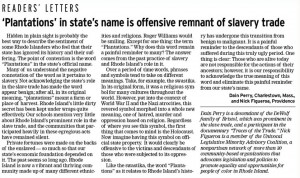I’ve previously blogged about the grassroots effort in Rhode Island to change the state’s name. In short, this movement seeks to remove the words “Providence Plantations” on the ground that the word “plantation” is now too intertwined with slavery.
There is a letter to the editor in today’s edition of the Newport (R.I.) Daily News arguing the case for this name change. The letter is co-authored by my uncle, Dain Perry, and Nick Figueroa of ULMAC:

Dain is, like me, a direct descendant of James DeWolf, the leading slave-trader in U.S. history, and appears in the documentary Traces of the Trade: A Story from the Deep North. Nick is a leading figure in ULMAC, an organization which advocates on behalf of racial minorities in Rhode Island, and which has been pushing for the name change.
As I’ve reported previously, there is a joint resolution pending this year before the R.I. legislature on the name-change issue. The resolution has been the subject of hearings in both chambers this spring; it has passed out of committee in the House, and is awaiting action by the full House.
The letter is well-written and makes a strong case for changing the state’s name. My only quibble would be that the letter suggests that the word “plantation” has gone from being an innocent word to one which is dominated by a “malignant” image, much as the swastika became unavoidably linked to the atrocities of the Nazi era.
As someone who encounters the word “plantation” frequently in contexts unrelated to slavery, I’m unconvinced that this has become nothing less than the “true meaning” of the word today. As many dictionaries, encyclopedias, or the work of many historians would illustrate, “plantation” is still often used in ways entirely unconnected to slavery. Instead, I would have focused on an argument closely related to that offered in the letter and on the blog run by Nick and his group, We Are Not a Plantation: that the historical connection of the word “plantation” to slavery in this country naturally makes its use in the state’s official name deeply offensive to many of our citizens, particularly those with a deeply personal connection our history as a slave society.
To read the letter, you may click on the image above, or read the text of the letter below the jump:
Click here to read the rest of this entry




